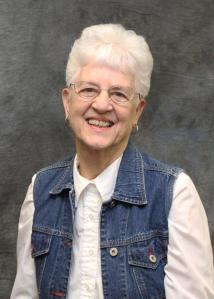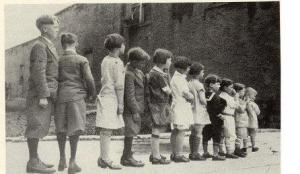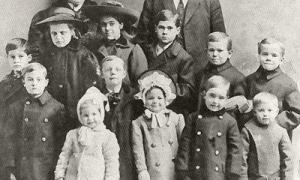 Author Eunice Boeve writes award-winning historical fiction for both adults and children. In her home state of Kansas, she has also had two serials of historical fiction for children featured in syndicated newspapers for a program called Newspapers in Education. The program, which targets schools, also provides guides for classroom use.
Author Eunice Boeve writes award-winning historical fiction for both adults and children. In her home state of Kansas, she has also had two serials of historical fiction for children featured in syndicated newspapers for a program called Newspapers in Education. The program, which targets schools, also provides guides for classroom use.
Eunice’s first story for the NIE in 2011 was a time travel story which she eventually lengthened and published as a book titled Echoes of Kansas Past. Last year’s serial, set during WWII about a boy whose father was fighting in Germany, was titled Wishing You Home. It went on to win third place in the Midwest Circulations Management Association contest for the NIE program, while the Kansas Press Association has underwritten the cost of making it available to schools for the 2012-13 academic year.
Eunice’s third serial, A Home for Us, will appear for the NIE program beginning Jan 22, every Tues and Thurs through Mar 15 The story concerns a boy on the orphan train, a theme she also used in one chapter of Echoes of Kansas Past where her two young protagonists are transported back in time to become riders on the Orphan Train. However, Eunice is not alone in using this part of America’s past. Put ‘Orphan Train’ into the Amazon search engine and you will find no less than twenty pages of books, videos and even music dealing with this aspect of American history. I was therefore exceedingly pleased that Eunice agreed to write about this for my blog this month.
***********************************************************************
America was and still is a shining beacon of hope and many have flocked to her shores. The first immigrants usually settled in the eastern cities with New York receiving the lion’s share, and especially so in the years between 1840 and 1869, when the city was inundated, creating a scarcity of jobs and housing. That, in turn, caused the breakdown of many families, and those who found themselves unable to provide for their children brought them to orphanages or abandoned them to the streets. Life was less certain in those days too, and the death of a parent or parents left still other children homeless.
 One estimate gives the number of homeless children roaming the streets by the 1850s at 30,000. In 1854, Charles Loring Brace, the founder and director of the Children’s Aid Society, came up with the idea of taking those children from orphanages and city streets, and sending them out on trains to farm families in America’s heartland. Farm tables, it was said, always had room for one more.
One estimate gives the number of homeless children roaming the streets by the 1850s at 30,000. In 1854, Charles Loring Brace, the founder and director of the Children’s Aid Society, came up with the idea of taking those children from orphanages and city streets, and sending them out on trains to farm families in America’s heartland. Farm tables, it was said, always had room for one more.
Dubbed the Orphan Trains, those trains made scheduled stops, sending out advanced notices in fliers and in newspapers, and those who could take a child or two gathered to await their arrival. One such flyer read: Homes for Children Wanted. A Company of Homeless Children from the East Will Arrive at McPherson (Kansas), Friday, September 15. The notice goes on to say that
sending out advanced notices in fliers and in newspapers, and those who could take a child or two gathered to await their arrival. One such flyer read: Homes for Children Wanted. A Company of Homeless Children from the East Will Arrive at McPherson (Kansas), Friday, September 15. The notice goes on to say that  these are children of both sexes, of various ages, and all well disciplined coming as they do from various orphanages. It also stated that persons taking a child/children must be recommended by the local committee. (Their names (6 of them) are listed at the bottom of the flyer.) Furthermore, the children are to be raised as family, attending school and church and properly clothed until they are eighteen years old, and that Protestant children are to be placed in Protestant homes and Catholic children in Catholic homes. Come and see the children and hear the address by the (attending ) agents, the flyer reads. Distribution will take place at the Opera House at 10:00 a.m. and 2:00 p.m.
these are children of both sexes, of various ages, and all well disciplined coming as they do from various orphanages. It also stated that persons taking a child/children must be recommended by the local committee. (Their names (6 of them) are listed at the bottom of the flyer.) Furthermore, the children are to be raised as family, attending school and church and properly clothed until they are eighteen years old, and that Protestant children are to be placed in Protestant homes and Catholic children in Catholic homes. Come and see the children and hear the address by the (attending ) agents, the flyer reads. Distribution will take place at the Opera House at 10:00 a.m. and 2:00 p.m.
Among the children who rode the Orphan Trains was Bill Ferris. He and his brother were to be sent on the train to the Midwest, but Bill got sick and the brother went alone to where, Bill did not know. The next year, Bill was among the next batch of orphans sent out on the train. In Nebraska, he stepped down off the train and waiting for him was his brother and the couple who had taken him the year before. Bill and his brother grew up in a happy, secure home.
Others weren’t so fortunate. One young girl got off a train in Kansas and lived a nightmare of abuse. Another child, “Hoot” Gibson of Missouri, lived in a Brooklyn orphanage until in 1923 at age 9, he was sent out on an Orphan Train and taken by a couple who had lost a son in WWI. They gave him the dead son’s name. Later, placed with another family, he was given another name. When he joined the army during WWII, he took back his original name.
Some children were taken as servants or hired hands. Some prospective “parents,” especially those interested in acquiring field hands and other laborers, checked limbs and teeth as if buying a horse. A few would-be-parents, caught up in the excitement of getting a child, thought better of it in the light of day with the actual child standing before them and backed out.
Most agents tried to keep siblings together in the same home, but often that didn’t work out. Two brothers rode the train to Texas. There they were taken into a home and both were happy until the couple decided they only wanted the little boy and so the bigger boy was sent to another home. Soon, though, that couple decided they didn’t want him either and so he was moved on again. This time, he was fortunate to be taken in by a couple with the capacity to love and understand a young boy and in time their home became his home.
Some orphanages sent people out the following year to check up on the children and if abuse was suspected or blatantly obvious, the children were removed, often to another family in the same or nearby communities.
Usually the children were accepted in the community and in the schools,  but some were bullied or ignored. Even some adults admonished their children to keep away from those “foreigners.” The children who were taunted and shunned, overworked, and ill-treated carried with them a kind of stigma and even as adults many would not acknowledge that they rode those trains. It is estimated that about 200,000 children were placed in this manner. The program ended in 1929.
but some were bullied or ignored. Even some adults admonished their children to keep away from those “foreigners.” The children who were taunted and shunned, overworked, and ill-treated carried with them a kind of stigma and even as adults many would not acknowledge that they rode those trains. It is estimated that about 200,000 children were placed in this manner. The program ended in 1929.
Concordia, Kansas houses the Orphan Train National Museum and Research Center that documents this part of history and keeps records for those looking for family connections. Some books available on this subject are: The Orphan Trains: Placing out in America by Marilyn Holt, The Orphan Trains by Annette Fry, and Searching for a Home by Martha Nelson Vogt and Christina Vogt For other information contact Amanda Wahlmeier, curator of the museum, at Concordia. 785-243-4471.
***********************************************************************
ALL PHOTOS COURTESY OF THE NATIONAL ORPHAN TRAIN COMPLEX, CONCORDIA, KS; Amanda Wahlmeier, curator
For more information on Eunice and her books, please go to her website at http://www.euniceboeve.net or reach her by email at roneun@ruraltel.net
 Echoes of Kansas Past: In this illustrated chapter book, fourth grade twins, Jack and Mollie, accidentally activate their parents’ time machine. Their first adventure in time and space is as Kanza Indians in 1620. From there they move on to meet others who in some way have shaped Kansas history, including a ghost, and a very famous horse. Available from Amazon, Barnes and Noble, and the publisher at http://rowepublishingdesign.com/Echoes_of_Kansas_Past.html
Echoes of Kansas Past: In this illustrated chapter book, fourth grade twins, Jack and Mollie, accidentally activate their parents’ time machine. Their first adventure in time and space is as Kanza Indians in 1620. From there they move on to meet others who in some way have shaped Kansas history, including a ghost, and a very famous horse. Available from Amazon, Barnes and Noble, and the publisher at http://rowepublishingdesign.com/Echoes_of_Kansas_Past.html
Eunice’s latest adult novel is Crossed Trails:
 The summer of 1877, Joshua Ryder seeking a life of solitude crosses the trail of a Nez Perce woman with a newborn baby and ends up in Virigina City, Montana. There he becomes the provider of an unlikely family and falls under the shadow of the hangman’s noose.
The summer of 1877, Joshua Ryder seeking a life of solitude crosses the trail of a Nez Perce woman with a newborn baby and ends up in Virigina City, Montana. There he becomes the provider of an unlikely family and falls under the shadow of the hangman’s noose.
Crossed Trails is available at http://www.whiskeycreekpress.com/store/index.php?main_page=product_info&cPath=66&products_id=1017 and Amazon and Barnes and Noble
My sincere thanks to Eunice Boeve for being my guest and sharing her knowledge of this fascinating part of America’s past.
















Andrea, Thanks for hosting me on your blog. Orphan Train stories have always fascinated me. How hard it must have been for those children even in the best of circumstances. At age 5, I felt orphaned when my dad died even though I still had a mother and siblings. But that is a long story.
LikeLike
Well thanks again for being here this month, Eunice. I, for one, have learned an awful lot about this subject from your blog!
LikeLike
As a native Kansan, and in research for my books set in Kansas, I often came across information about the Orphan Trains, and like you, Eunice, was fascinated by the subject. Tobias Proctor, a character in my novel The Bargain, came to Kansas on an Orphan Train but was so ashamed of his past he made up a story that he was born of well-to-do parents on a cotton plantation in Missouri. Wanting to marry a woman who deserved honesty, he confessed the facts of his dark, unfortunate childhood. And having heard of the Orphan Trains, she of course understood.
Thanks for this interesting blog!
LikeLike
Hi Irene, I’m just back from holiday vacation but wanted to thank you for stopping by. I’m totally fascinated by this subject as well, never having heard of the orphan train until Eunie told me she was writing her book. It’s amazing how many authors in different genres have used this piece of history.
LikeLike
Eunice,
Like others I never heard this story before. The ‘Hoot’ Gibson name set me to wondering. There was a western film actor by that name in the 50’s. It’s an unusual name. Could it be the same person?
LikeLike
Paul,
Hoot Gibson, the silent film to talkies star was born in Nebraska in 1892 and began his career in films in 1910. He died in 1962. It is quite possible that this orphan boy who was born in 1914, got the nickname “Hoot” because of the movie star. A little digging might produce the answer. Enjoyed your book Union Pacific.
LikeLike
Eunice,
Thanks. That makes sense.
Paul
LikeLike
Thanks so much Andi and Eunice, this story is so compelling and your sharing is appreciated. I’ve often heard bits and pieces but never some of the individual experiences. Thanks to you both.
LikeLike
You’re very welcome, Velda. Strangely enough, I was reading a book in an office waiting room earlier today and just discovered the heroine also came out on the orphan train! I’m beginning to feel as if I were the last writer to learn about this…
LikeLike
Velda,
Enjoyed your guest blog about “seniors.” Meant to respond and ran out of day. I do admire your tenacity and your writing. Us old gals still got it, so we still unashamedly flaunt. Right? 🙂
LikeLike
Until you talked about the orphan trains on your blog and at Women Writing the West, Eunie, I had never heard of them. Maybe they never got to Idaho. Thanks for this fascinating history–and so many children! This is a part of our past we should all know. And congratulations on the new series this year in the Kansas newspapers!
LikeLike
Hi, Julie, thanks for stopping by. Arletta and I are now hoping to eventually get a group together before or after the next conference to go to the museum in Concordia, KS Maybe you’ll join us?
LikeLike
The trains did indeed make it all the way west. In my WILLA Award winning novel, HELLIE JONDOE, I have my orphan train rider making it all the way to Pendleton, Oregon. Like many, I had no idea about orphans trains until I ran into the information quite by accident. I think it was a social experiment that was not entirely successful and therefore, got swept under the carpet of our history. These trains actually ran into the 1930s and there are still some riders alive today. I sincerely hope they have all written their life stories – for that is the history we all need to cherish.
LikeLike
Thanks for that input, Randall. I’m currently watching the film “Oranges and Sunshine” which is about the thousands of orphans that were shipped out of the UK to Australia right up until the 1970s or so. It seems like people used to consider orphans a disposable commodity!
LikeLike
Hi Julie,
There were orphan train children “placed” in every state, but the biggest majority were in the midwest. Randall Platt’s book Hellie Jondoe is about a girl who rode an orphan train to Oregon. I appreciate your congrats on my newspaper serial story to start next week. Thanks! By the way, I plan to attend the conference in Ks City so maybe I can go with the group to the Orphan Train Museum in Concordia, although I was just there last Oct. Wouldn’t it be fun!
LikeLike